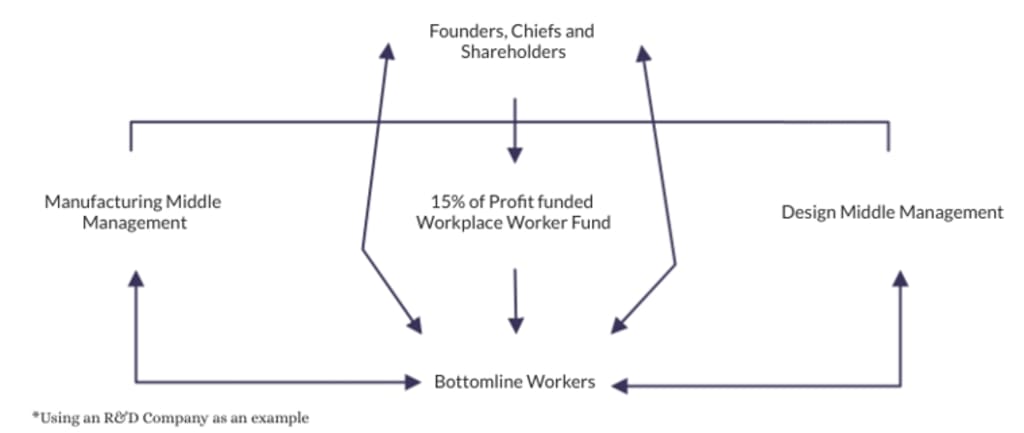Worker-Influenced Corporations: The Model that can Achieve growth and fairness to workers
Traditional Corporations are old news, but Co-operatives aren't always achievable, but there is an answer

As I mentioned in my previous article, Equality and Growth aren’t mutually exclusive, governments can run economies that incentivise equality through things like welfare, healthcare, education and workplace policy but Businesses can also run various models that have Equality and Democracy at their core. The most well known is the idea of Co-operatives, Co-operatives are businesses in which, the workers who work in business own equal shares in the business and thus vote on how the business operates. Since they own equal shares, they also get an equal kickback on profits assuming they put a dividend structure in place.
Co-operatives are extremely efficient in that they on average live longer than their private-shareholding counterparts, Banks on average trust them to pay back debts because all shareholders have an incentive to pay off the debts since it comes out of their dividends and don’t run the risk of laying off employees at the same rate as Private entities. Which can reduce the overall efficiency of a business as a whole and also give the business a bad reputation amongst would-be employees.
However, the often lengthy Democratic process of Co-operatives can find Co-operatives in dangerous waters in certain Highly-competitive sector such as the Tech sector and especially Tech Development sectors. Since a Co-operative in the Sector could be waiting a month or longer for all votes on one bundle of decisions to come back and in that time the competitors have already undercut the Co-operatives Sales or Manufacturing. But if the goal of a Democratic workplace that remains competitive is your goal, there are other models out there.
Worker-Influenced Corporate (WIC) models work well in the exact situation I was just outlining, in fact they were designed to fit this exact purpose. To create a democratic workplace in a highly-cut throat sector of the economy. WIC’s look, structurally pretty similar to a standard Corporation. They have Founders, Chiefs and Investors, they have a full board of directors. But the key is the Chief Peoples Officer, who is a shareholder in the business but their job is to decide on workplace policy, Pay, benefits, recruitment and rights of employees. From start to finish, the CPO is there to make sure that the workers have everything they need to maintain a healthy work-life balance and get paid fairly enough that they don’t have high levels of stress impacting them at work.
WIC’s also have a Workers fund, or Workers Pot where a percentage of profits post-tax and Post-overheads goes into and bottom-line employees can take money out as a grant to pay for things that either reduce stress or help the worker in their day to day. This can be anything as small as paying off rent arrears to paying for a new car to help them get to work. WIC’s also set the minimum salary as equal to that of the cost of living in the area that the business is located. They still have rising pay grades like you would see, but there’s a floor that goes up with inflation.
This all sounds great, but where’s the accountability and democracy? Well, remember the CPO, they’re not just accountable to the board, they’re accountable to the workers. Once a month or once every 6 months depending on how often dividends are paid out to the shareholders there is a survey of employees (non-corporate) who are asked to review their pay, working conditions, work-life balance, etc. They are then asked by the 3rd party conducting the survey, if they approve of the board as a whole and the CPO. If less than 70% of Workers approve of the way the workplace is handled by the board and CPO, then Dividends to the shareholders are frozen until the issue is resolved at the next survey.
This allows for the workplace to have a form of Bottom-up democracy that actually gets the message to the Corporate that they are not happy about their circumstances and incentivises the board to fix the issues risen in the survey with their workers. WIC’s allow there to be Democracy, Flexibility and Growth in a Highly-cut throat sector and provide a feasible alternative that could function in almost any area of the Economy, not just the Tech sector.
WIC’s are highly adaptable to the sectors they find themselves in and I think certainly could become the new norm for ethics-conscious businesses moving forward.
About the Creator
Quaker-nomics
My name is Abe, I'm a 3rd year Business Economics student mainly specialising in Alternative Business structures like Co-operatives and Accessibility. I mainly write about Business, Politics, Sociology and some personal stuff.
He/him






Comments
There are no comments for this story
Be the first to respond and start the conversation.